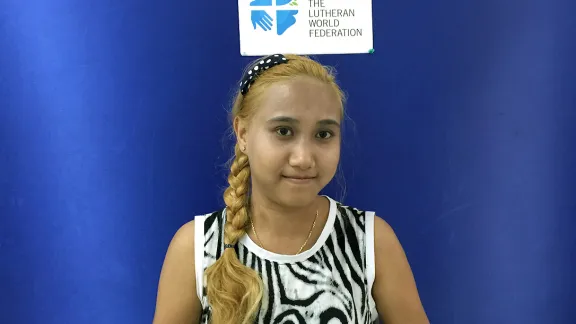
Camp management officer Nan Oo Hlaing is pleased when women speak up on matters. Photo: LWF Myanmar
“Committed to challenging work” with displaced people in Myanmar”
(LWI) - Managing a committee of camp managers is a complex job but one Nan Oo Hlaing handles with evenhandedness and calm.
She became a humanitarian worker in November 2013 after over 143,000 people were displaced during inter-communal conflict in 2012 in Rakhine state, west Myanmar.
Hlaing is the Camp Coordination and Camp Management Officer for The Lutheran World Federation (LWF) Myanmar’s Rakhine project, which offers camp management skills, shelter, relief goods and livelihood support to over 42,000 internally displaced people (IDPs).
“I am proud to be a humanitarian worker as a person who is able to help people in need professionally, in a transparent and accountable way,” Hlaing says.
“I am committed and motivated to do challenging work with the IDPs in a conflict scenario. I have a passion to challenge myself to see how fully I can apply the humanitarian principles of neutrality, impartiality and independence in my work,” she says.
Leadership, governance, coordination - and problem solving
With the LWF team, Hlaing works to strengthen the camp management committee, which is made up of representatives of 11 IDP camps to ensure smooth day to day running of the camp.
“Being the leader in the team, I oversee the planning, implementation and monitoring of camp care and maintenance activities in collaboration with local government authorities.” An implementation strategy agreed by the IDPs, the government and humanitarian agencies involved in the camp management cluster undergirds her work.
With the team, Hlaing trains the camp committee in leadership, governance, coordination and problem solving. She’s in close contact with emergency services, keeps camp profiles up to date and works with government departments.
Hlaing is also on a national roster to train camp management agencies and is the gender focal point of the LWF Rakhine field office. She works hard to ensure women, people with disabilities, the elderly and youth are included in decision-making bodies.
“Women’s participation motivates me”
“It is really satisfying to see that the IDP women are aware of their right to raise specific problems or issues related to women,” she says.
“Women’s active participation gives me more motivation. It is also challenging to make the people and government authorities understand the importance of camp management committees, which is a new sector for IDP camps in the state.”
Despite the many difficulties such as lack of meaningful participation of women, illiteracy and gender-based violence in the community Hlaing says she doesn’t “ feel reluctant or unwilling to face the challenges of my work in order to improve the lives of IDPs.”
Taking a careful approach
She realizes the job calls for a sensitive approach. “To achieve this, I need to be better equipped to manage and to take a participatory approach to decision making. I need to apply the “do no harm” and “conflict sensitivity approach” to my work. I also need to lead the team in a complex political, cultural and religious setting,” she says.
Hlaing refers to one case following cyclone Komen last year, whereby the camp management committee did not initially accept LWF’s proposal to distribute much-needed relief goods in two camps where houses had been damaged. She consulted with the committee, camp residents and religious leaders about , urgent need, lack of resources and ensuring equity. Eventually, they agreed to the distribution as planned, once they had understood that equity would be achieved.
Nan Oo Hlaing, LWF Camp Coordination and Camp Management Officer


